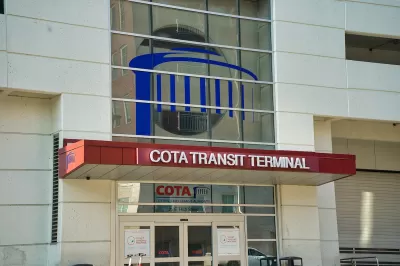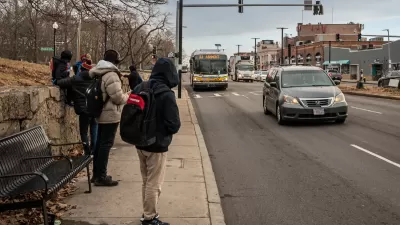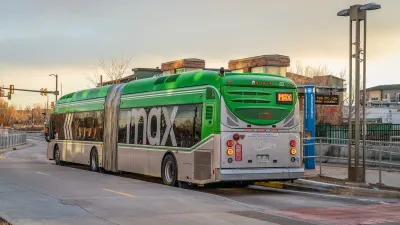The new sales tax will fund improved bus service, rapid transit projects, and ‘transit -supportive’ infrastructure.

Voters in central Ohio approved a half percent sales tax increase to fund improved bus service, bus rapid transit (BRT), and new sidewalks and bike paths.
As Jordan Laird notes in The Columbus Dispatch, “The levy permanently renews an existing 0.25% sales tax and adds another 0.5% sales tax. Combined with another 0.25% sales tax levy that is not on the ballot, approval of this levy brings COTA's total share of sales tax to 1% and Franklin County's total sales tax to 8%.” Roughly 57 percent of Franklin County voters approved the measure as of November 5.
The funding will allow the Central Ohio Transit Authority (COTA) to build the region’s first bus rapid transit (BRT) lines, increase bus service by 45 percent, and build over 500 miles of new sidewalks, bike paths, and trails by 2050. The LinkUS plan includes five rapid transit lines, with at least three planned as BRT. While light rail is not currently in the plan, officials say they have not ruled it out. COTA will also expand on-demand transit service zones, add late-night bus service, and build “transit-supportive infrastructure.”
Residents should start seeing improvements in service frequency and hours next year.
FULL STORY: Sales tax set to go up in central Ohio after voters give green light to COTA levy

Planetizen Federal Action Tracker
A weekly monitor of how Trump’s orders and actions are impacting planners and planning in America.

Maui's Vacation Rental Debate Turns Ugly
Verbal attacks, misinformation campaigns and fistfights plague a high-stakes debate to convert thousands of vacation rentals into long-term housing.

Restaurant Patios Were a Pandemic Win — Why Were They so Hard to Keep?
Social distancing requirements and changes in travel patterns prompted cities to pilot new uses for street and sidewalk space. Then it got complicated.

In California Battle of Housing vs. Environment, Housing Just Won
A new state law significantly limits the power of CEQA, an environmental review law that served as a powerful tool for blocking new development.

Boulder Eliminates Parking Minimums Citywide
Officials estimate the cost of building a single underground parking space at up to $100,000.

Orange County, Florida Adopts Largest US “Sprawl Repair” Code
The ‘Orange Code’ seeks to rectify decades of sprawl-inducing, car-oriented development.
Urban Design for Planners 1: Software Tools
This six-course series explores essential urban design concepts using open source software and equips planners with the tools they need to participate fully in the urban design process.
Planning for Universal Design
Learn the tools for implementing Universal Design in planning regulations.
Heyer Gruel & Associates PA
JM Goldson LLC
Custer County Colorado
City of Camden Redevelopment Agency
City of Astoria
Transportation Research & Education Center (TREC) at Portland State University
Jefferson Parish Government
Camden Redevelopment Agency
City of Claremont





























